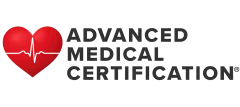How to Prepare Yourself for a Medical Certification Exam
LET’S FACE IT: studying for medical certification exams is not an easy task. In fact, it’s a daunting task that many medical professionals put off, or simply do not do at all. This results in wasted time, money and an overall sense of discouragement. If you are a healthcare professional with a medical certification final approaching, it is crucial to adapt your study habits for success in your PALS, ACLS, or BLS certification exam.
How to Prepare for a Medical Certification Exam?
Below, we’ve listed our top 5 tips to better prepare yourself for a passing score on your final exam.

1. Break a sweat
While regular cardiovascular physical activity seems unrelated to improved studying, researchers from The University of Texas – Dallas published a study that found a positive correlation between regular physical activity and improved brain retention and health. Not only is cardio healthy for your physical fitness, but also it is also healthy for your brain function and cognitive abilities.
You don’t have to run five miles everyday before an exam to see the benefits. Simply jogging, swimming, dancing or cycling for just 20 minutes a day will increase your energy levels, reduce stress, and improve retention – factors in which all can increase your final medical certification exam score tremendously.
2. Don’t stuff yourself
Reaching for the extra cup of coffee as your eyelids become heavy during your 6-hour-long study session? We’ve all been there. Cramming, however, is not beneficial, especially in the long run.
Psychologist Doug Rohrer from the University of South Florida conducted a study that tested the cramming theory. His results proved that “overlearning”, or attempting to learn more material immediately after mastering new material, is wasted time. Humans simply do not have the cognitive ability or capacity to memorize huge chunks of information at one time, and remember the information after the test.
On the other hand, interval studying works. Consider distributing your learning in periods of 20 minutes to an hour, taking multiple breaks as needed in between.
3. Catch some ZZZs
Ever pulled an “all-nighter” and still performed poorly on the exam? While many stay up all night cramming to perform better on the exam, sleep deprivation leads to absentmindedness, lethargy, irritability and an overall sense of not feeling well. According to Steve Holbrook for the U.S News and World Report, “all-nighters” cause forgetfulness, do not work long term, will poorly affect grades, and are ineffective. Furthermore, the alertness you might feel, or your “second wind” of energy, is actually a very temporary feeling of excitement prior to bedtime.
4. Change of scenery
Sick of sitting in the same spot, staring at the same thing? Spending days and nights on your desk alone can be boring and frustrating, resulting in ineffective studying for ACLS, PALS and BLS certification exams. Instead, switch it up by changing locations. Simply changing the room you’re in, or stepping outside, can make all the difference.
According to the New York Times article Forget What You Know About Good Study Habits, simply alternating rooms while studying actually improves retention.
Studying for your next medical certification exam doesn’t have to be a burden. Try implementing these simple techniques for greater success within your certification or recertification process.
We want to know: What are your favorite tips on effective studying?

